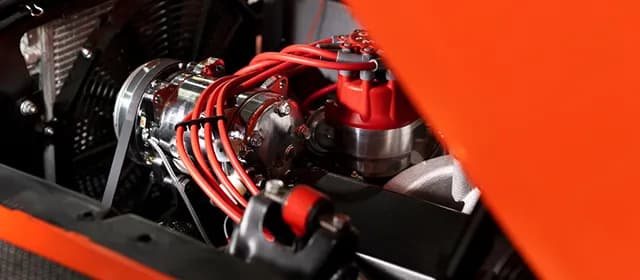The attraction of van travel is capturing the attention of adventure enthusiasts. Whether going for long drives or vacations, the world of van living offers a myriad of opportunities to accommodate various aspirations. As we are already witnessing an upsurge in the adoption of electric vehicles, the next big question looming is about the possibility of electric vans. Do these vans offer more than the normal, conventional vans we know?
Let's explore and review all the aspects of these vans in the electrical world.
What is an Electric Van?
An electric van, or EV van, is a vehicle powered by electric motors instead of traditional internal combustion engines. It is designed for various commercial and personal uses, offering benefits such as zero emissions, lower running costs, and no noise. All these features are making the EV van popular worldwide. Even customized vans, such as electric delivery and utility vans, are gaining popularity.
The EV van market has seen significant growth in recent years, with a wide variety of models available and more on the way. According to Kings Research's recent report, the global electric van market is estimated to accrue USD 104.29 billion in revenue by 2030, growing at a compound annual growth rate (CAGR) of 26.76%.
How does an Electric Van Work?
EV vans operate using electric motors instead of traditional internal combustion engines. They can be categorized into two main types: fully electric vans (BEVs) and plug-in hybrid electric vehicles (PHEVs).
- Fully-electric vans are powered solely by their batteries and produce zero exhaust emissions.
- PHEVs combine electric power with an internal combustion engine.
An all-electric van is equipped with an electric motor, a charge port that connects to an external power supply, which is needed for recharging the battery pack, and a big traction battery pack that powers the motor. The electric motor replaces the internal combustion engine, and the vehicle must be plugged into charging equipment or a wall outlet for recharging.
Why Choose an Electric Van Over a Conventional Van?
Below are some of the various factors contributing to the growing interest in EV vans as a viable and sustainable option for numerous commercial and personal transportation needs.
- Environmental Benefits: EV vans produce zero tailpipe emissions, reducing air pollution and contributing to a cleaner environment.
- Cost Savings: EV vans can offer lower running costs due to reduced fuel expenses and potential tax incentives. For example, the UK government provides a grant that covers 35% of the purchase price of large electronic vans, up to a maximum discount of £5,000.
- Performance and Efficiency: EV vans can provide a smooth and quiet driving experience, and they often have lower maintenance costs attributed to the simplicity of electric motor mechanics, compared to traditional combustion engines.
- Flexibility and Convenience: With the electric grid that is usually near most parking locations, electronic vans and plug-in hybrid electric vehicles (PHEVs) have the benefit of flexible charging, making them convenient for daily use.
Top 3 Electric Vans Currently Running on the Road
Following the popularity of electric cars, there is a growing inclination towards experiencing the sensation of EV vans. Companies are designing a range of vans tailored to meet comfort and utility preferences, reflecting the evolving demand from customers. Take a look at the three latest electronic van models below.
1. Ford e-Transit
Ford presents the e-Transit, an all-electric van with advanced propulsion that comes in various height and length variations. It has a 68-kWh battery and a 180- or 265-bhp electric motor, with a claimed range of up to 196 miles. It's quiet, and the torque electric motor is considered the best-driving Transit manufactured so far. Ford also extends its electric lineup with the smaller e-Transit Custom and e-Transit Courier.
2. Volkswagen ID. Buzz Cargo
The Volkswagen ID. Buzz Cargo, an electric camper van, is a chic city vehicle with a fixed partition and durable cabin. This electric cargo van has a smaller load space of 3.9 cubic meters but can still load two pallets. Its cabin offers a durable feel while providing an extra rubber floor and additional storage space. The car has a 77-kWh battery and a 204-bhp electric motor, providing up to 256 miles of range.
3. Renault's Kangoo E-Tech
Renault's Kangoo E-Tech is an improved version of the electrified vehicle. It features a 45-kWh battery and a 121-bhp electric motor, offering a range of up to 186 miles. This electric minivan has a maximum load volume of 4.2 cubic meters, a payload of 764 kg, and a towing capacity of 1,500kg. Its centrally folded passenger bench seat can be turned into a handy work surface, offering comfort and utility.
Is it Possible to Convert a Normal Van into an Electric Van?
If you love your existing van but still want to get the experience of an electronic van while contributing to eco-friendly transportation, then you have the option of retrofitting.
A retrofit is a process that converts an old gasoline or diesel vehicle into an electric one. Licensed professionals can dismantle the original mechanics and replace the powertrain with an electric motor and batteries. This saves the vehicle's original engine and offers benefits like limited running costs and reduced maintenance.
Additionally, many cities and local authorities provide incentives for electric vehicle owners, including free or heavily subsidized parking. For example, the City Council in some areas offers free parking on all council sites for a nominal yearly fee, and certain programs provide free parking to all-electric vehicles, including vans, at designated city-owned garages and parking lots.
To Wrap Up
The rise of electric vans represents a significant shift towards sustainable and eco-friendly transportation options. As technology advances and the market for electric vehicles grows, electronic vans offer numerous advantages, such as zero emissions, lower running costs, and quieter operation.
With ongoing improvements in parking and an expanding range of models, EV vans are poised to play a pivotal role in shaping the future of urban and commercial transportation. It is an eco-friendly approach that caters to the ever-evolving needs of businesses and individuals alike.

.webp&w=3840&q=75&dpl=dpl_HkC6vhtovZ9gdp5f4CCyQszcdnYs)

